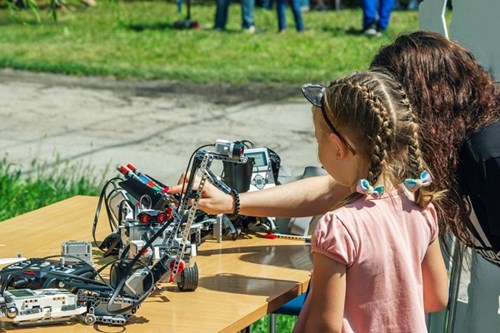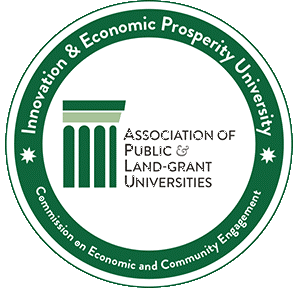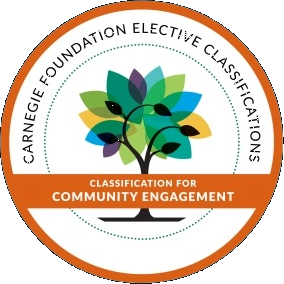March 23, 2022
Contact: Emily Springer, Communication Manager, Communication and Information Technology, University Outreach and Engagement, sprin116@msu.edu

Young student learns about robotics through hands-on demonstrations
EAST LANSING, MI – The 10th annual Michigan State University Science Festival recently announced its full schedule of free events, celebrating and exploring science, technology, engineering, arts, and mathematics (STEAM). Beginning April 1st, and continuing throughout the month, individuals of all ages are invited to attend events both in-person and on a virtual platform after the festival has solely offered virtual programming the past two years.
The festival’s keynote speaker is Dr. Karen Marrongelle, Chief Operating Officer of the National Science Foundation (NSF), who will speak to the importance of scientific progress, both in the past and looking toward the future. Interested individuals are asked to register to attend through Zoom on Friday, April 1st from 7:00 – 8:00 p.m.
“The National Science Foundation is one of the country’s premier agencies for funding science research and education,” said Laurie A. Van Egeren, interim associate provost for University Outreach and Engagement. “We’re thrilled to have Dr. Marrongelle joining us to talk about scientific advancements, in line with this year’s theme ‘Envisioning the Future.’ Her words will set the stage for events throughout the month as attendees learn from, and engage with, leaders and innovators in our scientific community.”
One of this year’s main features, Science in the Gardens, invites attendees to visit MSU’s Horticulture Gardens on April 9-10. Attendees will explore such things as butterflies in the garden and machine learning, to understanding how well movies obey the laws of physics, chemistry demonstrations, and much more.
Other feature events for the 2022 MSU Science Festival include:
- Statewide Astronomy Night (April 8)
- Nights at the Museums
- Tours and Open Houses
- Talks with Experts
- Dazzling Demos
- STEAM Adventures
Not only will attendees be able to participate in programs, tours, and hands-on learning on MSU’s campus, but they will also have the opportunity to connect with scientific venues in regions throughout Michigan, including a museum in Kalamazoo, a planetarium in Jackson, and an observatory in Detroit.
All events are free, and a full list of in-person / virtual events, frequently asked questions, resources for educators, and more, can be found by visiting Michigan State University’s Science Festival website.









